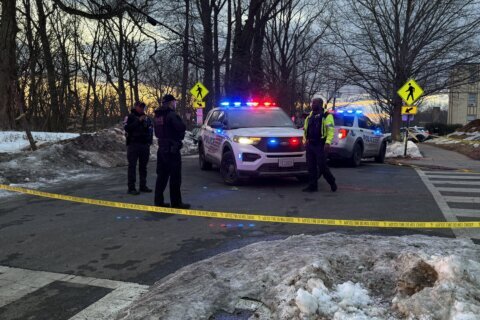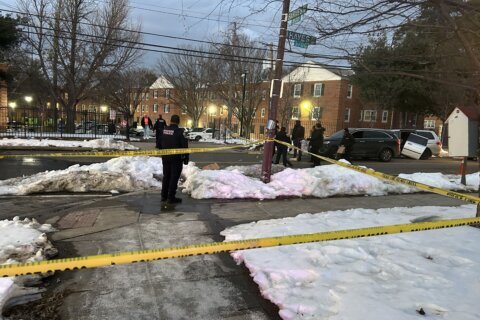D.C. Council members clashed with officials from the District’s health and school agencies during a contentious call Friday.
One of their points of contention resulted in a change later Friday afternoon — DC Health has updated the list of “red flag” symptoms that should prevent a student from being sent to school.
A fever alone is now considered reason to keep a kid at home. Before Friday, it was on the list of symptoms that could indicate COVID-19 or perhaps something else, meaning that kids needed two or more to be kept home.
The red flag symptoms are a new or worsening cough; shortness of breath or difficulty breathing; a loss of taste or smell, or a fever. The other symptoms are chills; muscles or body aches; headache; sore throat; unusual tiredness; nausea of vomiting; runny nose or congestion, and diarrhea.
As of the time of Friday’s call, a fever wasn’t a sufficient reason to keep a student home, and health officials got an earful from council members about that.
Ward 6 Council member Charles Allen said there was significant confusion among parents.
“I’ve got a lot of incredibly confused parents around the guidance that was put out that, if my kid has a fever, they’re coming to school; if my kid’s vomiting, they come to school,” Allen said. “It doesn’t make any sense. And it’s really throwing a lot of people for a loop.”
Patrick Ashley, of DC Health, acknowledged that it could be “a little bit confusing.” He said that guidance specifically referred to COVID symptoms.
“We obviously want individuals to stay home if they are sick. But we also don’t want to proactively exclude students,” Ashley said. For example, he said, a cough could be coming from an allergy. “We want to make sure we’re looking at the whole picture and not just excluding them based on symptoms. So … I acknowledge the confusion there.”
Allen said he recommended health and school officials “have another go” at the guidance. “Because it’s confusing a lot of people right now.”
At-Large Council member Christina Henderson asked D.C. Public Schools to update their guidance, and “better yet — give parents a flowchart. If this, then that. If any of these, don’t come to school. If any of this, come to school, right? Like, let’s just make it as easy as possible, so we don’t have to go through the drama with the parents and family.”
Friday afternoon, Henderson said via Twitter, “Appreciate DC Health updating this so quickly after the call!”
📣 Appreciate DC Health updating this so quickly after the call! https://t.co/QE48DqHhmC
— Christina Henderson (@chenderson) August 20, 2021
Allen said he appreciated the clarity, too.
Several CMs & I brought this up on our weekly COVID call w/ Executive & DOH. Appreciate that they updated quickly in response. Key update – a child with fever should stay home from school. Previous guidance confused many by saying a kid should come to school with just a fever. https://t.co/qBduZqWFHm
— Charles Allen (@charlesallen) August 20, 2021
Nurses
Another key sticking point Friday was the role that nurses will play in the schools.
Ashley emphasized that nurses would not be responsible for COVID-19 testing or dealing with school kids who have symptoms, calling the distinction important.
Any testing will be handled by the Office of the State Superintendent of Education.
Henderson sought clarification on what symptomatic children would face if the school nurses took a hands-off approach.
“The troubling part that I’m hearing is that the school nurses are being told they can’t interact with any student who is potentially COVID-positive or is displaying symptoms that could be COVID related,” Henderson said. “And so my question is, who in the building is now going to be responsible for that child?”
She asked whether DCPS would be providing additional services for those kids.
“We know that there are some symptoms that could be COVID. And it could be an allergy. Is the kid supposed to wait for the person from DCPS … to figure out: ‘Are you having an allergic reaction or are you having a COVID symptom?'” Henderson said.
Ashley responded that the nurses would do “what’s in the best interest of the child.”
“And that may include … sending them to the health isolation suite, which is where the COVID individuals, individuals with COVID-like symptoms, will go. The key point is that they will not stay in the nurse’s suite,” he said.
Henderson then asked about the situation from a cost perspective.
“We are paying for these nurses. So why don’t we let them do nurse-like things, as opposed to paying other people to do the nurse-like things as well?” she said.
D.C. school leaders had already criticized the plans on handling COVID-19 during a meeting Wednesday night.
Jessica Sutter, Ward 6 member of the D.C. State Board of Education, asked school leaders what their reactions were to learning that “medical professionals won’t deal with medical needs.”
Friday’s exchange came as many parents anxiously await the return to in-person learning in the District. The first day of classes is scheduled for Aug. 30.
Testing
During a D.C. Council call last week, City Administrator Kevin Donahue said DCPS plans to test 10% of students for COVID-19 every week.
“I wanted to ask about your previous goal was to sample 10% of the students, when you actually did only 4%,” At-Large Council member Anita Bonds said. “And I want to know, since you’re keeping the goal of 10%, are we assured that 4% results will continue? Or, what are we doing to increase the result so that we get closer to 10% or more?”
OSSE Chief of Staff Shana Young said it was important for parents to opt their children into the testing program.
“Our hope is that — as we’re all on the same team here, wanting to get our kids in school and stay there — families will opt in, and that that percentage, more of our school communities will participate in the testing so we can do that monitoring.”
The consent form is available online.
‘We don’t learn’
At-Large Council member Elissa Silverman said that the District government isn’t learning “one of the main lessons of COVID: that there is a disparity in our city [for those who] have access to resources and access to information, and that not only creates anxiety, but real health consequences.”
She said the poorest and most vulnerable are affected the most.
Silverman called the DCPS testing regime “half-baked” and added that “it doesn’t seem like we have the mitigation strategies that other systems have used at the elementary school level that contain spread, like pods.”
She added, “I’ve been struggling for an hour to figure out how to ask a constructive question here, but it just doesn’t seem like we keep learning. Or, we don’t learn from what we keep seeing over and over and over again with COVID.”
Donahue shot back: “Council member, we’re here each week. We try to keep it professional. And I don’t know how you ask a constructive question when you start with an accusation over motivation. … Your colleagues do ask really tough questions, without interweaving, in the questions, an accusation about character. So I don’t know how to answer your question.”
Silverman again said there was disparity in D.C. “And if we don’t pay attention to that, it ends up with real health consequences for our poorest residents. And our most vulnerable residents.”
“I’m not attacking character … But the issue is, I mean, this is a very real issue, there’s a lack of competence throughout our city, in our government, because we’re not taking even basic steps to mitigate health risk.”
Donahue agreed that there is disparity that “interweaves almost every aspect of our city life and our national life, that includes disparities in educational outcomes.”
“I can assure you that everything that D.C. Health, DCPS, OSSE, and everyone here does is very intentional and motivated by mitigating and narrowing and eliminating those disparities.”
- Sign up for WTOP alerts
- Latest coronavirus test results in DC, Maryland and Virginia
- Coronavirus vaccine FAQ: What you need to know
- Latest vaccination numbers in DC, Maryland and Virginia
Looking for more information? D.C., Maryland and Virginia are each releasing more data every day. Visit their official sites here: Virginia | Maryland | D.C.








